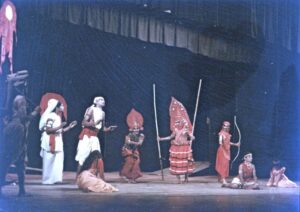Another Extravagant Postcolonialism: Modernity, Multilingualism, and Theory/Practice Paradigms in Urban Indian Theatre
Credentials: ENGLISH 859 (Seminar in ITS)
Website: Professor Aparna Dharwadker
Phone: Mondays 9:00 AM – 11:30 AM

In recent scholarship, the idea of an “extravagant postcolonialism has signaled a focus on individuality rather than collective social reality in select Anglophone novels of the post-1955 period. This course takes up the concept to consider altogether different forms of “extravagance in the colonial/postcolonial Indian cultural forms, and poses a series of questions that postcolonial studies has so far largely failed to address. What happens when we move away from Anglophone fiction-centered models of postcolonial cultural production and tackle the inherently syncretic, multilingual field of modern Indian writing, with the textual/performative field of modern urban theatre as our primary case study? How does Indian theatre manage the interpenetration of two major systems of theatrical representation: Indian and European, classical/traditional and modern, anti-realistic and realistic, provincial and metropolitan? What are the forms and processes of modernity and modernization that transform the powerful legacies of “tradition in performance? What is the relation of print culture to the performative genre of theatre? What is the relation of drama and theatre to popular and mass-cultural media? How does multilingualism function at the levels of writing, print, and performance in a polyglot national space? What “theories of theatre do these complex conditions generate, and how are the theories embodied in practice?
The objective of the course, therefore, is to develop complex models of colonialism and postcolonialism that can enable us to actually understand and interpret less familiar but no less vital cultural forms in the postcolony. The primary materials are drawn from the richly diverse field of modern Indian theatre, recognized now as a major component of contemporary world theatre. However, the specific plays and performance histories also serve as “case studies for theoretical approaches/analyses that draw broadly on postcolonial studies, theatre and performance studies, theories of translation and transculturation, modernist studies, media studies, subaltern studies, gender studies, and the critique of ideology. In this respect, the
course is relevant to graduate students working in a range of disciplines and pursuing one or more among these diverse methodologies. For students focusing specifically on drama, theatre, and performance, the course provides an intensive introduction to all aspects of a singular but neglected non-Western tradition. For students specializing in India/South Asia, it covers a prominent modern subcontinental form, fully contextualized in relation to literary, cultural, and political history since the mid-19th century. All materials for the course will be in English.